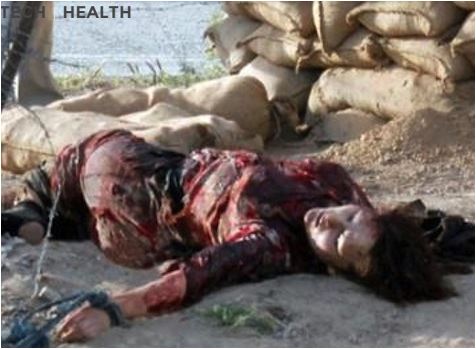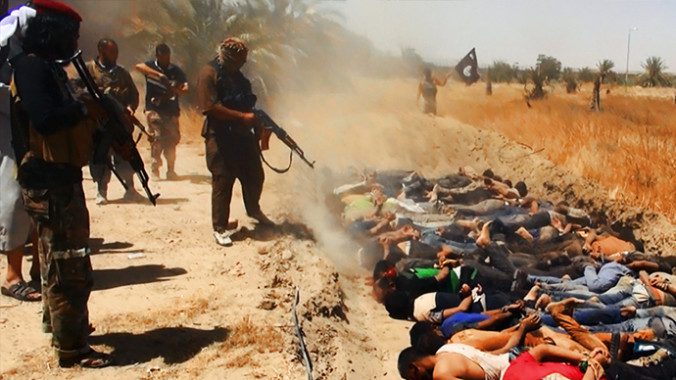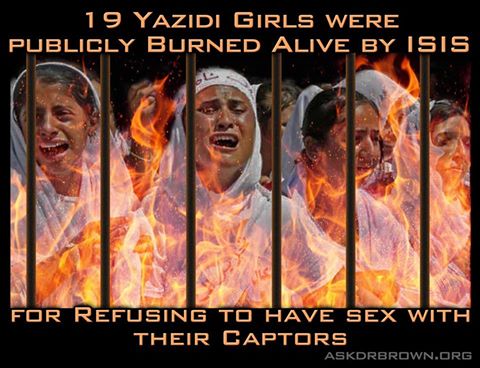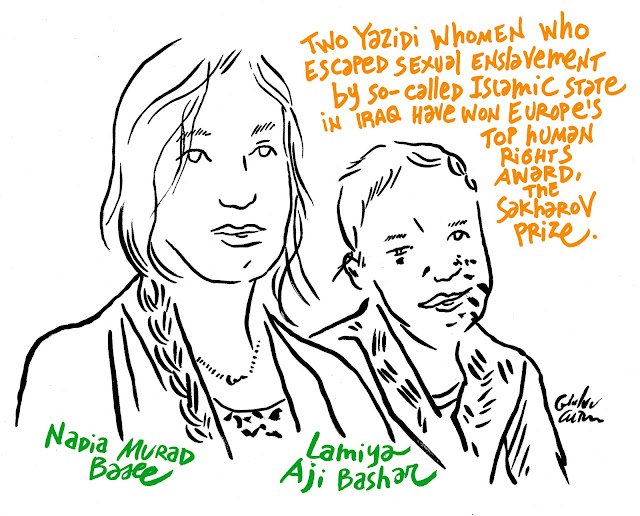When IS
swept into Mosul, Iraq’s second city, 80 miles west of Kocho, elders
realised their village might become caught up in the spiralling
conflict, but they never thought peaceful civilians like them would be
targeted.
However, in early August 2014, after capturing the nearby city of Sinjar, two cars filled with IS fighters arrived.
‘They
asked us to convert, but said they would do no harm,’ Lamiya says. The
village was surrounded, yet a few families managed to flee.
Then, on August 15, a large force of black-clad men stormed the village – locals recognised some as those from nearby towns.
Everyone was ordered into the school, stripped of all their possessions, and females were taken to the first floor.
‘I
was so scared. I was thinking of my father, my family, my life. Then they took all our men, fathers, sons, brothers and slaughtered them like animals.’
The girl in the above picture was forced to recite the koran while she was being gang raped. When they finished with her, they slit he throat and called her a whore.
It
was the last time she saw her father and two brothers. ISIS told the
terrified women that the men were being sent to Mount Sinjar, where many
Yazidi had sought refuge. ‘Ten minutes later we heard the shooting
start,’ recalls Lamiya.
The
men were slaughtered in their own streets. Then the women were split
up: married women and younger children were taken to nearby Tal Afar,
while unmarried women and teenagers were sent to Mosul. Older women, ugly women, disabled women, sick women and girls were
made to lie down in a ditch and were shot dead the next day.
Lamiya
and three of her sisters soon got a taste of the fate that lay ahead.
‘The men began attacking us, ripping our clothes, roughly touching us and kissing us.’
In
Mosul, the captives were forced into a big building filled with
hundreds of similar-aged Yazidi. It turned out to be a market for
militants to buy sex slaves. ‘Men came all the time to choose girls. If
someone refused to go, they were beaten bloody with heavy cables. It
was so painful to see these old men, these monsters, raping the girls out in the open.
Even girls of nine and ten were crying and begging not to be attacked.
I
can’t describe how horrible it was to not be able to do anything to stop them. Watching a 6 year old girl being raped by a group of 60-70 year old men out in the open kills a little piece of your soul.’

A Saudi man
in his 40s bought Lamiya and one of her sisters, taking them to the ISIS
stronghold of Raqqa and keeping them handcuffed much of the time. ‘He
was a very bad man,’ she says.
‘He beat us for the three days we were with him.'
‘ His teeth were rotted and his body odor was overwhelming. He had not bathed in weeks and was covered in lice and scabs. Once he tried to kill me with his hands around my neck because I rejected his advances.’
To
soften up the sisters, the man took the pair to an ISIS base and threw
them into a room. ‘There were about 40 fighters who raped us. Sometimes in groups, sometimes one after another after another. Every sick perverted deed that came into their minds was forced upon my sister and I without any breaks. You can’t
imagine the horror of two small girls left at the hands of so many monsters.
Terrible things happened to us at the hands of these muslims.'
Afterwards
the girls were sold to different fighters, fetching about £100 each.
Lamiya ended up with an even more brutal man from Mosul.
Although
kept in a locked room, she made the first of five escape attempts when
alone in an apartment by jumping from a window. Spotting a local man,
she begged him for help and he took her to hide in his home for three
days.
‘The family
asked if a relative could come and pick me up, but they were all in
captivity. The family was afraid of Daesh/ISIS, so after three days the man
called two fighters, betraying me. He told them that he had found a girl.’
Her
‘owner’ was quickly tracked down thanks to a computerized registration
system used by ISIS to record sales of women. Before being handed back,
Lamiya was tortured and sodomized by six men. Bleeding from every orifice, eyes swollen from crying, her furious master beat her
viciously for defying him.
After
her second escape attempt, the man sold her. When I tell Lamiya she was
obviously trouble, she smiles shyly for the first time.
‘Every time I tried to escape they tortured me, but it made me stronger. I never gave up. I saw so many atrocities, so many crimes. This gave me the power to keep fighting against them.’
She
was taken by a white-haired man from Mosul, who lived with his wife and
son. ‘I begged him you cannot take me into your family as a slave. Please don’t do things with me there. He laughed saying that the prophet muhammad gave all muslims the right to own sex slaves. He also said that women are not to speak because they are only property. Then, like a hundred muslims before him... he beat me and raped me.'
‘I
once asked his wife and mother to help protect me from the sexual abuse,
but they said that was his right since I was an infidel. She told me that all infidels like Christians and Jews are worth less then nothing in the eyes of Islam.'
This
man held her for two months. Later Lamiya discovered he had another
wife: a blonde, blue-eyed younger woman who spoke German. ‘She was very
nice but I could not believe she accepted this man. She said it was allah who commanded her husband to do these things. So to be a good muslim was to own sex slaves. She accepted it because it was the will of allah.’
After
another escape attempt, Lamiya was passed on to an IS emir. ‘Each man
was worse than the one before, everyone said I was
difficult, so they beat me from the start. They were always beating me, raping me, sodomizing me,
always abusing me.’
The
IS leader was an expert bomb-maker, with a big basement in Mosul filled
with cars, liquid explosives and electrical equipment. Lamiya was made
to work beside men making suicide vests. She was taught to connect the
wiring as they churned out 50 devices each day.
As she worked, she heard air raids and missiles exploding nearby.
‘I
hoped they would attack us and we would die, I wanted to
end my suffering. I also wanted them to destroy this terrible place
because it was making bombs to kill innocent people.’
At one
point, when some other Yazidi girls were bought down to the basement,
Lamiya persuaded them all to make a dash for freedom. This led to
another brutal beating and her being hauled before the sharia court.
She
was later kept by a surgeon, who made her run errands in his hospital.
Eventually, he gave her a mobile phone so that he could summon her, but
Lamiya used it to contact an uncle in Kurdistan.
At
that point, she was being held close to the Kurdish front line, and her
uncle paid a smuggler $7,500 (about £6,100) to get her out.
She
walked through the night with Katherine, another teenager from Kocho,
and a nine-year-old girl called Almas. But at 4am, Katherine
inadvertently stepped on a mine, killing her and the nine-year-old, and
leaving Lamiya with her terrible injuries.
All Lamiya
remembers after the explosion was very little, which happened nine months ago.
Kurdish soldiers carried her to hospital, where doctors were forced to
remove one of her eyes. They also treated her wounds before her uncle
came for her.
Later
she was taken to Germany by Luftbrucke Irak (Air Bridge Iraq), a
charity that helps children and terror victims. The charity funded two
more operations, restoring some sight to her left eye, and laser
treatment to soften her facial scars.
Unsurprisingly,
Lamiya remains traumatized and is plagued by hoffific nightmares. ‘I think about
the suffering of all those other girls who are still there, trapped in hell. ’ she says through bitter tears.




















No comments:
Post a Comment